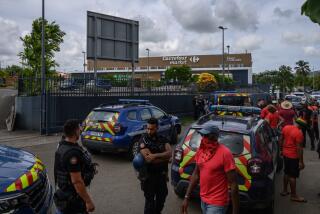EU and Spain turn down Catalonia’s plea for mediation after independence vote
Reporting from Barcelona, Spain — Many Catalans huddled over their cellphones Monday on Barcelona’s metro, replaying videos of Spanish police raids on polling stations a day earlier.
Some people wondered aloud whether such scenes, and a 90% referendum result in Spain’s northeast region of Catalonia in favor of independence, might shock Europe into mediating the crisis between the country’s government and the region’s separatists.
The regional president of Catalonia, which borders France, called for the immediate withdrawal of Spanish forces, and for European intervention.
He got neither.
European leaders, aside from a few who called for dialogue, mostly fell in line Monday in supporting the government of Spanish Prime Minister Mariano Rajoy, who sent 5,000 extra troops to Catalonia to try to halt Sunday’s vote on secession. Spanish courts had ruled the referendum unconstitutional.
With 7.5 million residents, Catalonia has its own language and culture, which were repressed during the nearly 40-year dictatorship of Gen. Francisco Franco, who died in 1975. Since then the region has grown into Spain’s economic powerhouse, making up 20% of the Spanish economy, with the tourist hub Barcelona as its capital. Some Catalans resent having their taxes subsidize poorer parts of Spain, and have long lobbied for more fiscal autonomy from Madrid.
Health authorities in Catalonia said 893 people were injured when Spanish police smashed their way into polling stations Sunday, dragging voters out by the hair in at least one case, and confiscating dozens of ballot boxes. Some police fired tear gas and rubber bullets. In a statement Monday, Spain’s Interior Ministry said 431 officers were lightly injured.
Amnesty International condemned “excessive use of force” by Spanish police against voters the human rights group said were “passively resisting” them.
Catalans said they would walk off the job en masse Tuesday in a regionwide general strike to protest their predicament.
“I would say that psychologically, a lot of the Catalan people have already left the Spanish state,” said Neus Valls, who voted for independence.
The 28-nation European Union should “stop looking the other way” and send mediators to Catalonia, said the region’s president, Carles Puigdemont. “This is not a domestic issue. The need for mediation is evident.”
Puigdemont said the Catalan parliament planned within days to formally declare independence from Spain, but he urged Rajoy to discuss matters before that happens.
“If he calls me this very day, I’ll reply,” Puigdemont told reporters. “We’ll arrange a meeting right away, without conditions.”
Rajoy did not call Monday. Spain’s interior minister, Juan Ignacio Zoido, told Catalan TV that national police would remain in Catalonia as long as needed.
Late Monday, about 350 protesters blocked passage of several national police vehicles in downtown Barcelona, chanting at them to “go home!” Spanish media reported 400 national police and Civil Guards were evicted from hotels in the town of Calella, on the Mediterranean coast north of Barcelona, apparently on orders from the town’s separatist mayor.
In Brussels, a spokesman for the EU’s executive branch said its policy was unchanged, and that Catalan separatism remained an internal Spanish matter.
“The main consequence of a unilateral declaration of independence would be to invite an even more forceful reaction on the part of the central government,” said Federico Santi, a political analyst at the London-based Eurasia Group.
A part of Spain’s Constitution, Article 155, allows the national government to suspend all powers of a regional government if it “acts in a manner that gravely attacked the general interest of Spain.” It has never been invoked.
On Sunday, 90.9% of votes cast in the banned referendum were in favor of Catalan independence, and 7.87% were against, according to Puigdemont’s regional administration.
It was impossible to verify whether the numbers were accurate. The vote tally was done by separatist officials, not independent analysts. Officials said 2.26 million ballots were cast, out of 5.3 million registered voters.
French President Emmanuel Macron spoke to Rajoy by phone Monday, according to a statement from Macron’s office. It said the French president noted his attachment to Spain’s “constitutional unity.”
Frayer is a special correspondent.
More to Read
Sign up for Essential California
The most important California stories and recommendations in your inbox every morning.
You may occasionally receive promotional content from the Los Angeles Times.










